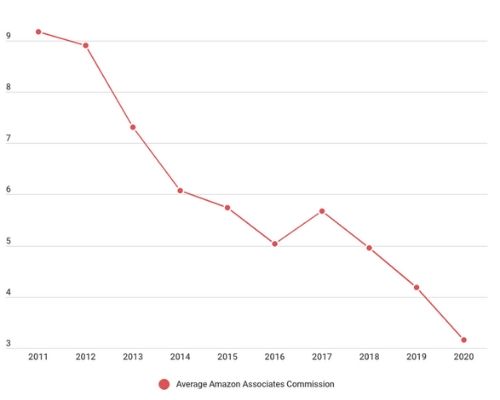Niche Sites Died in 2015, Why Authority Sites Reign Supreme in 2024
Whether to start a niche or an authority site was a common debate a decade ago. In 2024, we have our answer, authority sites are the winner. Here’s why.
What’s the Difference Between a Niche Site and an Authority Site?
Niche sites have 10 to 50 posts about a particular commercially viable topic. Authority sites have no ceiling for the number of posts or topics they’ll write about.
Niche sites tend to gravitate towards keywords likely to generate sales for high-paying affiliate programs. Authority sites are more willing to target informational queries with less commercial intent and have more robust monetization strategies.
Why Authority Sites Are Clearly Better in 2024
A decade ago, you could create a website called ToasterPlanet.com, write 10-30 posts about the best toasters, and make some serious money (mainly from Amazon Affiliate sales). Unfortunately, Amazon has been slashing affiliate commissions for the past decade now.

Niche sites have gone from making 9% per sale in 2011 to only 3% in 2020. And there’s reason to be concerned that Amazon Affiliate commissions will continue to drop. While I’d be surprised if commissions ever went to 0, I wouldn’t be completely shocked either.
You’re clearly going to need to find higher-paying affiliate programs than Amazon going forward. But, regardless of which affiliate program you choose, they all have the same problem that they will probably cut rates someday.

Worse, Google has been getting more competitive year over year. In 2011, you could write 30 posts about commercial intent keywords and easily rank. Now? It’s significantly harder. “X Best Products for Y” posts have gotten quite competitive over the years.
This matters because the 1st ranked post gets 10x the traffic of the 6th ranked position and 100x the traffic of the 11th ranked post. In the past, a noob could lazily grind out 30 “best X for Y” posts and rank #1. If you did that now and ranked 6th or 11th, you’d be getting somewhere between 1% and 10% of the traffic you used to get.
| Rank | Click-Through-Rate | Clicks From 10k Keyword Searches |
|---|---|---|
| #1 | 31.24% | 3,124 clicks |
| #2 | 14.04% | 1,404 clicks |
| #3 | 9.85% | 985 clicks |
| #4 | 6.97% | 697 clicks |
| #5 | 5.50% | 550 clicks |
| #6-#10 | 3.73% | 373 clicks |
| Page 2 (combined) | 3.99% | 399 clicks |
| Page 3+ (combined) | 1.60% | 160 clicks |
If we pretend 30 posts on an Amazon niche site generated $5,000 a month at its peak in 2012. When you cut the traffic down to 10% and the affiliate commissions down to 33%, that same site would be earning $165/m today. Factor in inflation and Amazon niche sites aren’t looking so hot these days.
Authority Sites Rank Higher in Google
I wrote an entire post about why you shouldn’t build multiple blogs.
The gist is that 25 posts on 4 websites are NOT as valuable as 100 posts on a single website. More posts allow for more opportunities to generate backlinks, to increase your domain age, better internal linking opportunities, etc. You will rank higher across the board if you keep everything on one larger site vs. several smaller sites.
The game is all about giving yourself the best chance to rank #1 and authority sites do a much better job of that than niche sites ever could. Pretend that you managed to maintain your #1 ranking in your 2012 niche site. Your niche site that was making $5,000/m in 2012 would still be earning $1,650/m today. While that’s obviously a huge downgrade, it’s not as big of a downgrade as somebody outranking you in Google is.
Google Nerfed Several Niche Site Ranking Tactics
1) Exact Match Domains
Remember when I gave the toasterplanet.com example above? I did that because Google gave out serious ranking bonuses if your keyword was in your domain name. It was one of the hacks that made the whole niche site model work. In 2024, that’s gone. Why?
2) Keywords Are Dead, RankBrain is King Now
Another big difference between 2024 and 2012 is that in 2012 Google was much more dependent on keywords. In 2012, if you wrote a post about “How to change a car battery,” it was a good idea to include “How to change an automobile battery” as well. Niche bloggers could take advantage of this by outranking the bigger players simply by focusing on the more obscure synonym.
Then in 2015, RankBrain came about. Long story short, Google’s now using artificial intelligence to understand searcher intent more than they are specific keywords. Now what happens is Google ranks you for the initial keywords it finds in your post, then RankBrain goes to work expanding the graph and seeing what else your post solves. Here’s an example of what this looks like from my post on embedding a private YouTube Video.

As you can see, Google starts with all my seed keywords, then expands outward and tests as many related keywords as its AI thinks would fit the post. Advantage authority sites.
Task Switching Makes You Less Productive
Pretend that Amazon hadn’t slashed rates and Google wasn’t rigging the game in favor of bigger sites. You’re still going to be more productive building a single authority site.
Each site adds overhead to your life. Potentially different hosting, themes, affiliate signups, emails, products to build, etc. If you’re a one-man-band, consolidating will always be more efficient than spreading yourself thin.
An Authority Site Allows You To Build Your Own Product
Something that gets lost with many new bloggers is that Amazon Affiliate and Ads never paid all that well to begin with (and never will). Sure, if you have 400,000 visitors a month, you can make six figures even with a $20 RPM (it’s worth doing). But, that blinds many to the fact that they’d earn 10x that rate by creating their own product.
Authority sites are geared towards you being able to sell a single product to your audience. You’ll have a lot more repeat traffic and visitors on a site you spent more time branding as opposed to cold traffic. And all the content will be related enough that you don’t need 10 different products for 10 distinct topics. Not only will you get more traffic, but you’ll make more money from that traffic with an authority site.
So stop buying the outdated 2012 logic of creating a niche site and consolidate to one site today!


